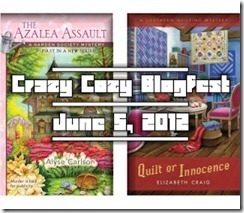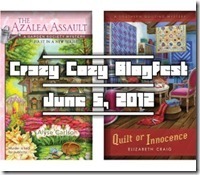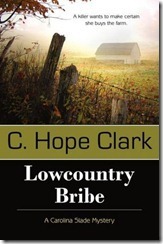Elizabeth Spann Craig's Blog, page 179
April 28, 2012
Twitterific
by Elizabeth S. Craig, @elizabethscraig
 Twitterific is a compilation of all the writing links I shared the previous week.
Twitterific is a compilation of all the writing links I shared the previous week.
The links are fed into the Writer’s Knowledge Base search engine (developed by writer and software engineer Mike Fleming) which has over 15,000 free articles on writing-related topics. Sign up for our free newsletter for monthly writing tips and interviews with top contributors to the WKB or like us on Facebook.
 Don't' forget the new release blogfest that Hart Johnson and I are hosting on June 5th—find more information and sign up here. The best entries get signed copies of our new releases.
Don't' forget the new release blogfest that Hart Johnson and I are hosting on June 5th—find more information and sign up here. The best entries get signed copies of our new releases.
Have a great week!
Tips for writing about mental illness in your novel: http://bit.ly/Idy7fZ @fantasyfaction
1 writer's process for final edits: http://bit.ly/Ih0UPW @byrozmorris
3 important questions to ask your characters: http://bit.ly/Ih1fSU @livewritethrive
Writing vs. marketing: Those 10,000 hours: http://bit.ly/JBNPD3 @Porter_Anderson
Tips for writing better fiction: http://bit.ly/Ih1kWN @mooderino
6 reasons writers still want publishers: http://bit.ly/I5SZXz @rachellegardner
Tips for writing a synopsis: http://bit.ly/IYHr8r @nicolamorgan
The Importance of Persistence: http://bit.ly/Jlpmlt @thecreativepenn
Most Frequently Challenged Library Books of 2011: http://bit.ly/I5TbWN @galleycat
Study Shows that More People are Reading: http://bit.ly/I5TiSm
A look at common suffixes: http://bit.ly/I5Tz7K @writing_tips
The 10 Bestselling Fiction Authors of All Time: http://bit.ly/I5TBMV @PassiveVoiceBlg
A Strong Take Off? Opening Pages That Hook: http://bit.ly/I5TGQQ @janice_hardy
The basics of POV: http://bit.ly/I5UepK @VirginiaKantra
Sonnet writing tips: http://bit.ly/I5Uk0B @AnnieNeugebauer
Dial DRM for endless debate: http://bit.ly/IGByKL @Porter_Anderson @doctorow @glecharles
Blog tours--tips for finding and querying hosts: http://bit.ly/Ilc9Vj @NickThacker
5 Tips For Writers on Planning Their Con Season: http://bit.ly/I5UmWa @BryanThomasS
When the Dream of Being Published Doesn't Materialize: http://bit.ly/I5UuFi @livewritethrive
3 Things to Know About Exposition & Telling: http://bit.ly/I5UwNp @victoriamixon
10 ways to spark creative connections: http://bit.ly/I5UFQY @cherylrwrites
When to Mail Short Fiction To Traditional Publishers: http://bit.ly/I5UJQM @deanwesleysmith
Groundbreaking Tools for Creating eBooks: http://bit.ly/I5VCZw @janefriedman
Being Subtle With Subtext: http://bit.ly/I5VKIn @StinaLL
5 ways to pace your story: http://bit.ly/I5VXva @KMWeiland
Pushing our manuscript to the next level--1 writer's process: http://bit.ly/I5Wa1E @aswinn
How Committed Are You, Really? http://bit.ly/I5Wmh9
Shape Up Flabby Writing with Stronger Words: http://bit.ly/I5WKwd @2KoP
5 Ways to Enhance Your Facebook Timeline Page With Images: http://bit.ly/I5WWeV @smexaminer
Questions to ask yourself when reading your book's 1st 5 pages: http://bit.ly/I5X9yB @4kidlit
Characters Must Grow: http://bit.ly/I5Xem8 @AdriennedeWolfe
Crime fiction--when to produce the body: http://bit.ly/I5XvW9 @mkinberg
How To Dish Out Backstory In Digestible Bites: http://bit.ly/IJLcvg @roniloren
How to Get More Blog Traffic from Pinterest: http://bit.ly/IJLfHo @catseyewriter
The Importance of Persistence: http://bit.ly/Jlpmlt @thecreativepenn
Jodi Picoult and the Myth of the Segregated Marketplace: http://bit.ly/Iz50lL @DavidGaughran
The Writing Life: Fear, Want, Dissatisfaction, Defiance: http://bit.ly/Iz53OC @DavidBCoe
Portraying a multiple individual: http://bit.ly/Iz5bh1 @JulietteWade
2 kinds of new agents: http://bit.ly/Iz5ecI @behlerpublish
The wordplay and music of poetry: http://bit.ly/Iz5g4e @diymfa
Avoid Overactive or Inactive Characters & Subplots: http://bit.ly/Iz5mJ8 @writersdigest
Self-Publishing and Paperbacks — Is Print Still Worth It? http://bit.ly/Iz5o3R @goblinwriter
10 Ways to Spark Creative Connections: http://bit.ly/Iz9id0 @cherylrwrites
Ways to amplify your writer's voice: http://bit.ly/Iz9zws
Are Self-Published Authors Happier Than Traditionally Published Authors? http://bit.ly/Iz9B7s @thecreativepenn
The 3 top monster stories and what keeps them popular in the 21st century: http://bit.ly/Iz9NUt @tordotcom
Book Design: Choosing Your Paragraphing Style: http://bit.ly/Iza4GX @jfbookman
Daring to be an original--voice: http://bit.ly/IzabCc @kristenlambTX
What to Do When You Offend or Disappoint a Reader: http://bit.ly/IzalcK @jodyhedlund
Better Bend Than Break: On Staying Flexible: http://bit.ly/IzbrFs @DelilahSDawson @janice_hardy
5 Ways to Fix a Boring Bio: http://bit.ly/IzbzEV @KeithCronin
The artistic product: http://bit.ly/IsRSOK @Ravenrequiem13
The Secret to Your Next Creative Breakthrough: http://bit.ly/J5G8PI @jeffgoins
5 rules 1 writer lives by: http://bit.ly/J5Gben @mooderino
How Amazon is redefining the book market: http://bit.ly/HXeiqU @InsideRetailau
The Atlantic's List of Greatest Girl Characters in Literature: Really? http://bit.ly/HXeztV @tordotcom @mari_ness
An agent discusses the learning experience of being an intern: http://bit.ly/HXeLt5 @bookendsjessica
Writing lessons learned from "Shatter Me": http://bit.ly/HXeSFa @juliemusil @TaherehMafi
How Authors Should Use Tumblr, A 5-Step Guide: http://bit.ly/HXf07F @galleycat @RachelFersh
Listing and Quoting on GoodReads: http://bit.ly/HXfgmZ @blurbisaverb
Does your story have something new under the hood? http://bit.ly/HXfive @behlerpublish
Worldbuilding--manners: http://bit.ly/IvD5D9 @JulietteWade
Tips for pacing your novel: http://bit.ly/IvFjlU @Mommy_Authors
Retail DRM Is an Apple. Library DRM Is an Orange. http://bit.ly/Ihhzpo @ShiftTheDigital
Why you should have comments, even when they're bad: http://bit.ly/IvFttq @mathewi
Finding People to Read, Review and Recommend Your Book: http://bit.ly/IvGbXM @JFBookman
6 reasons authors self-publish: http://bit.ly/IvGQIE @rachellegardner
Dual duties of chapter endings: http://bit.ly/IvH7eG @noveleditor
5 Words Caught in Semantic Drift: http://bit.ly/IvHQfT @writing_tips
True Fans and Indie Publishing: http://bit.ly/IvI3zJ @jenniecoughlin
Sorting Out the Mess of a Chaotic Book Draft: http://bit.ly/IyW6nX @originalimpulse
The Rejection Generator – Pay Your Dues Fast: http://bit.ly/IyWenG @PassiveVoiceBlg
Post-Publication Depression? The Months after a Book Release: http://bit.ly/IyWsLj @womenwriters @authormonica
Are eBooks Really Good For The Environment? http://bit.ly/IyWFhQ @ebooknewser
When Literary Opposites Attract: http://bit.ly/IyX43B @NewDorkReview
25 reasons 1 writer might hate your main character: http://bit.ly/I6ng99 @ChuckWendig
Lee Child: Legendary Late Bloomer: http://bit.ly/HYoNtV @DebraEve
10 Lies You Might Tell Yourself While Editing: http://bit.ly/I6nFZc @elspethwrites
Publicity or spam? http://bit.ly/JT8GNE @nicolamorgan
Freelance Success Is About Process, Not Personality: http://bit.ly/I9eGoT @JaneFriedman @wellfedwriter
The process of agents submitting manuscripts: http://bit.ly/I9eW7f @SaraMegibow
Dualing with words--action & dialogue: http://bit.ly/I9fdai @kaath09
10 ways to spark creative connections: http://bit.ly/I5UFQY @cherylrwrites
Tips for writing & receiving testimonials: http://bit.ly/JDsI1o @beth_barany
The Art of Collaboration in Writing: http://bit.ly/JDsYNV @mistymassey
Conferences--Where The Editors and Agents Are: http://bit.ly/JDt3B8 @jhansenwrites
Start with Failure: The Advice No Aspiring Writer Ever Wants to Hear: http://bit.ly/JDt8F6 @HilaryGraham @4kidlit
What 1 SF writer learned from watching Star Trek: http://bit.ly/JDtuLO @piperbayard @NicoleBasaraba
Unusual historical settings as story inspiration--Isle of Dystopia: http://bit.ly/HZOr1B @GeneLempp
Research--why you should start at the library: http://bit.ly/HZOE4H @EV_Mag
Plotting is Like a Jigsaw Puzzle: http://bit.ly/HZOMkP @fictionnotes
Creative Writing vs Professional Writing: http://bit.ly/HZOWc2 @greyhausagency
Exploding Myths & Destroying Minds: http://bit.ly/HZOZo2 @davidgaughran
Biographical Information in a Query: http://bit.ly/HZP9vI @Kid_Lit
Top 1,000 Best Romance Novels: http://bit.ly/HZPgrb
Writing is an illusion: http://bit.ly/HZPFtF @megmims @Ravenrequiem13
Are eBook Authors Unwittingly Losing Sales? http://bit.ly/J9qram
Some reactions to Tor's DRM-free announcement: http://bit.ly/J9rLKk @robotech_master
3 tips for developing and using a media kit: http://bit.ly/J9sOdk @duolit
Poetry.com Returns: http://bit.ly/J9v7gr @victoriastrauss
Facebook or Twitter, Which Is Better for Book Promotion? http://bit.ly/J9v9oo @goblinwriter
The Poetic Process: http://bit.ly/J9vk39 @diymfa
How freelancers and other writers can use Pinterest: http://bit.ly/J9vyHo @michellerafter
Why The Elements of Style Breaks Its Own Rules…and Why You Should Too: http://bit.ly/J9vAPM @readingape
Professional Editors: The Smart Writer's #1 Competitive Advantage: http://bit.ly/Ilk58P @thecreativepenn @mattgartland
Believable fantasy character design: http://bit.ly/IlkoAu @BenGalley
5 Things Songwriters Can Do To Move Their Careers Forward: http://bit.ly/IlkGYk @cliffgoldmacher
8 Tips to Keep From Going Batty as You Launch Your Writing Career: http://bit.ly/Iq8Z1u @SamuelPark_ @annerallen
The Role(s) of Reversal in Fiction: http://bit.ly/Iq9dWt @BTMargins @lgreffenius
Blog touring--write great guest posts by keeping your stories about your stories: http://bit.ly/Iq9mJn @byRozMorris
Story Structure--2nd Half of the 2nd Act: http://bit.ly/Iq9skj @KMWeiland
What 1 writer has learned about writing a novel: http://bit.ly/Iq9ybz @sarahpekkanen
Inside Amazon's Idea Machine: How Bezos Decodes The Customer: http://onforb.es/Iq9Ij8 @GeorgeAnders
A Bit of Controversy in Your Platform? http://bit.ly/Iqa9di @THahnBurkett
A Quiz About Hyphenating Phrasal Adjectives: http://bit.ly/IGyXQY @writing_tips
Writing is a crazy profession. But you can take control over your stress: http://bit.ly/IGzdzw @sarahahoyt
The New World of Publishing: No Balance: http://bit.ly/IGzhPI @deanwesleysmith
Using archaeology, myth, & mysteries for writing inspiration--fairy chimneys: http://bit.ly/IGzuSR @genelempp
3 things you should know about your story: http://bit.ly/IGzGBJ
Defining a scene and its length: http://bit.ly/IGzKkQ @livewritethrive
Writing & Publishing Terminology 101: http://bit.ly/IGzORO @janefriedman
Stretching emotions in category romance: http://bit.ly/IGzYsk @Louisa_George
Show Your Setting through the POV Character's Eyes: http://bit.ly/IGAgzp @JodieRennerEd
Tips for genre blending: http://bit.ly/IGAC99 @storyfix
Springtime for Amazon? Positive stories on the retailer: http://bit.ly/Ie7kCv @ljndawson @Porter_Anderson @jwikert @brianoleary @gluejar
Writing vs. marketing: Those 10,000 hours: http://bit.ly/JBNPD3 @Porter_Anderson
Freelance Success Is About Process, Not Personality: http://bit.ly/I9eGoT @JaneFriedman @wellfedwriter
Does your story have something new under the hood? http://bit.ly/HXfive @behlerpublish
The process of agents submitting manuscripts: http://bit.ly/I9eW7f @SaraMegibow
The Rejection Generator – Pay Your Dues Fast: http://bit.ly/IyWenG @PassiveVoiceBlg
Plotting is Like a Jigsaw Puzzle: http://bit.ly/HZOMkP @fictionnotes
3 Dos and 3 Don'ts of Requesting Book Reviews: http://bit.ly/IeElei @duolit
How to Cure your Comma Overuse: http://bit.ly/IeErCw @fantasyfaction
Why every man MUST read a romance – and every woman a thriller: http://bit.ly/IeEG0C @speechwriterguy
Worldbuilding--manners: http://bit.ly/IvD5D9 @JulietteWade
How to Give Your Book Cover a Better First Impression: http://bit.ly/IhRB3a @TweetTheBook
A look at Young Adult Fiction: http://bit.ly/IhRGUC @NicoleBasaraba @julie_glover
Believable fantasy character design: http://bit.ly/IlkoAu @BenGalley
An Agent on Adjusting Expectations for Conferences and Critiques: http://bit.ly/IzhNCj @Kid_Lit
Is Your Character Talking the Talk Instead of Walking the Walk? http://bit.ly/IzhRSq @KMWeiland
The "It" Factor for your Protagonist: http://bit.ly/IzhZRS
Figuring Out Your Writing Style: http://bit.ly/IfpQcM @danyelleleafty
April 26, 2012
Don't Kill ‘Said Bookisms’ On-Sight--by Chihuahua Zero
by Chihuahua Zero, @chihuahuazero
 Pick any ten writing blogs in the writing blogosphere, and I bet nine of them will say: "don't use said-bookism!"
Pick any ten writing blogs in the writing blogosphere, and I bet nine of them will say: "don't use said-bookism!"
This is understandable. Excessive amounts of dialogue tags besides said and asked are often syndromes of an amateur. Pull up a random fan-fiction, and it's likely there's a dialogue tag like laughed or quipped or even the infamous ejaculated.
These types of words pop out and are clunky to the point of being distracting.
However...
Counter-Examples:
...like the good old "show, not tell" rule, the "don't use said-bookism rule'" isn't in effect 100% of the time. Or even 80%.
For instance, I used the Nicolas Flamel series as an example in one of my posts on dialogue tags. While it used the word murmured one too many times, it's still a good series that has a decent amount of popularity. And despite its the almost total absence of dialogue tags, The Chronicle of Vladimir Tod slips some by when there are.
The Book Thief? I spotted a few mentions here and there.
Harry Potter? Slughorn ejaculated at Snape. Really.
Acceptable Uses:
Despite what advice you receive, you can say said-bookisms aren't as poisonous as you might have presumed them to be. Sure, it's lazy and overly colorful if you use a handful of them in one chapter, but or two don't spoil the entire bunch.
You can argue that "just because many works use it, doesn't mean it's good", but I don't think it applies here. Said-bookisms are mostly a mechanical element. They're not lazy plot device or cardboard characters. They're only a link in a long, fictional chain.
There are some cases some borderline said-bookisms that can work. It's safe to use shouted and whispered, to the point they're accepted alongside said/ask. They're volume indicators.
Some said-bookisms are awkward (like laughed and smiled), while there are some other sound tags that work based on context. For example, bark. Can a person bark a sentence? If you stretch the definition. Can you also howl, rasp, and bray? Your mileage may vary.
And in specific cases, like explained, admonished, and quipped:
I'm guilty of overusing "explained.” "Explained" are among the words that I tend to overuse, and will certainly be on my edit list. But I think other writers had that same compelling feeling to add it in, and decided to keep them in.I actually saw "admonished" in an old collaboration project. I wanted to delete it due to being wordy, but they voted to keep it. They said that it elaborated the sentences meaning, even though it's just a fancy word for "friendly explanation.” Thoughts.
"Quipped?” Get back on me about that.
Why You Need to Know This:
The point is that like any type of story mechanic, said-bookisms aren't 100% bad. They can be (and often are) misused and overused, but their presence doesn't condemn a work.
One reason why it's important to know this because over-thinking this can spoil your enjoyment of reading. It's good to keep a critic's mind open when reading, but for a few months, my mind kept seizing onto these words that my mind has long glazed over before several blogs pointed out that they were "bad.”
It wasn't until I read a couple of fantastic works my mind dropped this peeve and filtered them.
So, put down that gun, and worry about something else.
 Chihuahua is a young, aspiring writer who loves writing, reading, music, Chihuahuas and dark chocolate. CO can be found at Thoughts of a Young Aspiring Writer.
Chihuahua is a young, aspiring writer who loves writing, reading, music, Chihuahuas and dark chocolate. CO can be found at Thoughts of a Young Aspiring Writer.
Blog Image—Flickr-By krazydad / jbum
April 24, 2012
The One Thing You Should Do to Sell More Books—by Nick Thacker
by Nick Thacker, @NickThacker
 Twitter, social media platforms, Facebook pages, Google+, Pinterest, in-store signings, KDP Select, etc. All of these things are great innovations for authors, and can certainly help you get your books in the hands of more readers, but there's only so much you can do.
Twitter, social media platforms, Facebook pages, Google+, Pinterest, in-store signings, KDP Select, etc. All of these things are great innovations for authors, and can certainly help you get your books in the hands of more readers, but there's only so much you can do.
· After you've built the coolest Facebook page in the world, you have to tell people about it.
· After you've scheduled a million tweets promoting your new follow-up guide to your main character's life, you have to tell people to retweet it.
· And after you've booked a solid month of in-store signings, bookstore visits, and airplane kiosk drop-ins, you need to tell people about it.
As you can see, if there's one thing all of these promotions have in common, it's that they only work IF you can figure out how to tell people about them!
The catch-22 of it all is that self-promotion is supposed to be ABOUT telling people what you're up to!
So what can you do to guarantee that you'll get in front of hundreds—or thousands—of potential buyers?
I could say write, but I think that's obvious. J.A. Konrath writes a lot about the fact that he’s so successful is because he has a large backlist of books available.
Instead, I'll say write for other people.
As in write guest posts.
You may have come across a blog or website that featured an article written by someone other than the owner of that site (like this post!)--this is an example of a guest post.
The benefits of having your work posted on another site are many. First, you're getting exposure—for free. You're able to send targeted, ready-to-buy leads directly to your site, or your book's sales page. You can start conversations with people whom you may never have had the chance to meet, and you'll be able to extend your reach through this leverage.
I'm currently on a guest-posting binge, and I call it my "blog tour." These days, you can pay someone else to plan and run a blog tour for you, but I think most of the hard stuff can done on your own. I've identified the main concepts behind blog tours, especially as they relate to authors. Feel free to add in your own ideas:
1. Figure out what your "niche" is. If you're a fiction writer, this can be tricky—the people who read vampire dramas aren't always the same people who frequent paranormal websites. Identify some target markets that coincide with some of the subject matter of your book, and see if you can write a few posts in that niche.
2. Write a lot. Obviously, you're going to need to have a lot of content ready to go when you start the tour. If you can, start writing immediately--there's not really a limit to how many posts you can run, but I do recommend trying to shoot for at least 10-15 posts, each on different sites.
3. Start planning early. When I started my tour, I prepared a spreadsheet of the target blogs and websites I'd like to see my post on, and then identified the ways I needed to reach out to the bloggers. Also, I planned some good post headlines so I wouldn't need to write the post and decide on a topic at the same time.
4. Go for broke. Don't settle for small, silent blogs that are so desperate for content they'll bend over backwards to have you visit. It's great to help out the little guys, but it's even better when it's mutually beneficial. Try to "target" blogs that have a decent amount of activity—a few comments on each post, a regular posting schedule, etc.
5. Make sure you have time to continue writing your books. You're probably not in it to be the next great blogger—you're just using your blog platform and guest posting to reach out to people and build your author brand. Give yourself space to continue writing the stuff you love.
So, how do you find the blogs that you’ll be guest posting on?
· First, look through your RSS reader for those blogs you currently read. Don’t be picky, either. There’s a good chance that since you read that blog, it’s a good fit for the audience you’re trying to attract to your writing.
· Next, look on the blogs to see if there are guest posters. You’ll usually see this at the top or bottom of the post. It’ll say something like, “This is a guest post by…” These sites are great to write for, since they’ve already established that they accept guest posts.
· Then what you’ll want to do is single out the blogs that have posted guidelines for guest posts. These are the easiest to approach, since they’re comfortable with guest posters already, and are most likely used to unsolicited guest post submissions.
When you have a list of some great blogs, start pitching. Here’s what a pitch for a guest post might look like for you:
“Hi there!
I’m a huge fan of your site—been reading it for years, actually.
I’m trying to promote my next book, and I was wondering if you’d accept a guest post from me? I have one that I think would match your target audience perfectly, called, “[blog post title idea]”. Let me know what you think!
[Your name]”
Change it to your liking, but be sure to:
1. Thank the blogger for their hard work on building an awesome blog.
2. Be concise. Don’t waste their time with links to your book, your background, etc. Just pitch and win!
3. Add some information about the post. If they want the entire post, send it in the format they prefer. If not, give them an idea for a title that would fit in well.
Last, but not least.
Finally, don't give up. I've built a few blogs over the years, and every time I've gotten discouraged from writing so many posts that no one seemed to be reading, I'd give up. Now, my blog is getting some decent readership and it doesn't seem to be slowing down.
The difference this time, I won’t quit. I've pushed through the initial phase of slow growth, and I think if I stick with it, people will start to notice. If you take the same approach, and consistently add value to your readers' lives, you'll start to build a platform as well!
What do you think? Having a blog can certainly be a headache when you've got so much else to focus on as a writer, but it can also be a huge blessing—publishing companies are looking for authors who've started to build their own platforms now, and if you can do it well, you might just have a book deal on your hands!
 Nick Thacker is a blogger, writer, and author of
fiction thriller novels
. He likes to “hack” his life, and help people to
get more done and write better
.
You can subscribe to his mailing list here
.
Nick Thacker is a blogger, writer, and author of
fiction thriller novels
. He likes to “hack” his life, and help people to
get more done and write better
.
You can subscribe to his mailing list here
.
Post Image: 401k/Flickr
April 23, 2012
Platform Building for Writers—Getting Started
by Elizabeth S. Craig, @elizabethscraig
 Starting out with book promotion can seem like a tremendous undertaking. And it is. But the important thing to know is that anything you can do online to promote your book or create a presence for yourself online is going to help you sell books.
Starting out with book promotion can seem like a tremendous undertaking. And it is. But the important thing to know is that anything you can do online to promote your book or create a presence for yourself online is going to help you sell books.
For tips on starting out with platform building (the very basics…some of which I’ve seen established writers forget to cover), please join me at Barbara Hightower’s blog, Author Services at the Bistro.
April 21, 2012
Twitterific
All the links below,
 and over 15,000 others are found in the Writer’s Knowledge Base search engine, designed by Mike Fleming—where you can search on any topic for free. Like us on Facebook or sign up for our free monthly newsletter for the web’s best links on writing.
and over 15,000 others are found in the Writer’s Knowledge Base search engine, designed by Mike Fleming—where you can search on any topic for free. Like us on Facebook or sign up for our free monthly newsletter for the web’s best links on writing.  Don't' forget the new release blogfest that Hart Johnson and I are hosting on June 5th—find more information and sign up here. The best entries get signed copies of our new releases!
Don't' forget the new release blogfest that Hart Johnson and I are hosting on June 5th—find more information and sign up here. The best entries get signed copies of our new releases!Have a great week.
The 1st literary interactive book app: http://bit.ly/HylhXa @Porter_Anderson @MirabilisDave @joningold
MS Word Trick: Combining Changes and Comments: http://bit.ly/HHKHq1 @jamigold
Agent Contract Expiration: http://bit.ly/HylYzv
Freelance Writing: 10 Tips to Better Interviews: http://bit.ly/Hym4qR @writersdigest
How to Finish Your Novel: http://bit.ly/Hym5v4 @write_practice
Write Your Book Even When You Feel Clueless: http://bit.ly/HHKVNI @originalimpulse
Potential blog content problems and how to fix them: http://bit.ly/HHL2ZL @problogger
Leading into a Scene vs. Including Backstory: http://bit.ly/Jcng20 @juliettewade
What Would "Insert YA Heroine Here" Do? http://bit.ly/HHLpU3 @mittenstrings
Add details to ground readers in your scene: http://bit.ly/HHLtTQ @juliemusil
A useful resource for describing settings, emotions, shapes, textures, and more: http://bit.ly/eIGRMO @AngelaAckerman #writetip
Mini-ebooks--a home for articles that need a little room: http://bit.ly/IyB5we @annabaddeley
Will Hachette Be The First Big-6 Publisher To Drop DRM On E-Books? http://bit.ly/IyBgYs @laurahazardowen
5 things writers should know about being knocked out: http://bit.ly/HGiWII @ajackwriting
Write to Universal Acclaim? Not Likely: http://bit.ly/HGiZnZ @noveleditor
How to Write a Book When You're Really, Really Busy: http://bit.ly/HGj7Uw @chucksambuchino
8 things 1 writer learned analyzing her yearly freelance writing expenses: http://bit.ly/HGjj66 @michellerafter
How to Scan Your Site for Free: http://bit.ly/HGjo9X @jasonboog
Why we should attend conferences and a list of upcoming US cons: http://bit.ly/HGjFK7 @msheatherwebb
Tips for hooks in book openings: http://bit.ly/HGupMY @PegEditors
Do Big Publishers Need Recognizable Consumer Brand Names? http://bit.ly/HGuvEv @passivevoiceblg
How to Fix a Flat (Novel Scene) in 3 Easy Steps: http://bit.ly/IKNHNv @JulieWuAuthor
A Quiz About Compressing Accordion Sentences: http://bit.ly/IKOfTD @writing_tips
The Savvy Writer's Guide to Simultaneous Submissions: http://bit.ly/IKOP3A @BTMargins
Identify your novel's genre: http://bit.ly/IKOSfQ @rachellegardner
Discoverability and the New World of Book PR: http://bit.ly/IKPjaa @barbarahenricks @RustyShelton
The rejection resubmission: http://bit.ly/IKPEcJ @nicolamorgan
Art of the Genre: Top 10 Literary Sci-Fi/Fantasy Covers of the 1970s: http://bit.ly/IKPPoA
Adding a musical element to your worldbuilding: http://bit.ly/IKQ8j5 @fantasyfaction
Little Fixes to Improve Your Book: http://bit.ly/IKQhTN @maryannwrites
Creating Reality: The Pleasant Psychosis of Writing: http://bit.ly/IWICkn @BTMargins
Learning the writing craft over time: http://bit.ly/HJG4v7 @bob_mayer
Seeing the World through Your Character's Eyes: http://bit.ly/HJG7Y7 @livewritethrive
Author Blogging 101: Widgets, Sidebars and You: http://bit.ly/IWIVvr @jfbookman
Movies about writers: http://bit.ly/IWIZLP @BTMargins
The Illusion of Writing: http://bit.ly/IWJmpE @Ravenrequiem13
Keep Your Unwavering Passion to Write: http://bit.ly/HJGtxN @evemariemont @4kidlit
Are your characters making misleading assumptions? http://bit.ly/HJGIsE @Janice_Hardy
Show, Don't Tell: How Much of Your Story Is Implied? http://bit.ly/HJGL7P
Tips for A Better Book Presentation: http://bit.ly/HJGOAC @BTMargins
5 Principles for Using Facebook: http://bit.ly/HTkNMU @janefriedman
Women's Fiction Format: http://bit.ly/HKlGu1 @pprmint777
Self-Editing Tips to Make Your Manuscript Ready For Publication: http://bit.ly/HEsYcY @WritersCoach
The fully-developed book premise: http://bit.ly/HKlT04 @donmaass
Tips for reading novel excerpts: http://bit.ly/HLzPaJ @beth_barany
Overwriting--areas to edit: http://bit.ly/INXUJ3 @TaliaVance
Is Pinterest Traffic Worthless? http://bit.ly/HLA2uk @nestguy
Tips for finding an agent, from an agent: http://bit.ly/HLAfh5 @luciennediver
Signs Your Character Is Wasting His Potential: http://bit.ly/IOlkOx @KMWeiland
8 tips for guest posting: http://bit.ly/HJdZDr @duolit
Crushes and chemistry: http://bit.ly/HJe9uu @Kid_Lit
An agent asks, "Bitter or Misunderstood?" http://bit.ly/HJerl6 @bookendsjessica
Why Writing Through Resistance is Essential: http://bit.ly/IVJESj @ava_jae
16 Kindle Lending Library Titles Were Bestsellers In March: http://bit.ly/IVJKt6 @ebooknewser
Turning Your Twitter Followers into Readers: http://bit.ly/IVKsqs @pushingsocial
Profanity in worldbuilding: http://bit.ly/IVKzCn @juliettewade
When Books Mattered: http://nyti.ms/IE0J2S @NYTMetro
16 of the Top 100 Best-Selling Paid Kindle Books in March Are Exclusive to the Kindle Store: http://bit.ly/HF0m3s @PassiveVoiceBlg
Why Small Publishers Fail: http://bit.ly/IE10CN @victoriastrauss
Meditate, don't caffeinate: http://bit.ly/IE1bhi @misfitsmascara
Tips for writing effective dialogue: http://bit.ly/HF0Ia5 @writersdigest
Success in fiction writing is 50% practice and 50% persistence. Talent is optional: http://bit.ly/IN8oNE @Yeomanis
Where to Find Ideas For Novels Or Short Stories: http://bit.ly/HL1MhU @writersdigest
11 Revision Questions: http://bit.ly/HL1W95 @fictionnotes
9 ways to upset an editor: http://bit.ly/HL2eMU @jameslsutter
Being a tax-wise author, parts 1 & 2 (for US writers, but possible deductions for others): http://bit.ly/HL2njx , http://bit.ly/HL2prK
Plan the Story, Meet Your Characters. http://bit.ly/J1YWFe @christi_craig
Reading in Public: 3 Steps to Captivate Your Audience: http://bit.ly/J1Zg6Z @DIYMFA
Tips for writing suspense: http://bit.ly/J1ZyL1 @stacygreen26 @nicolebasaraba
Tips for writing convincing male characters: http://bit.ly/J20oYh @BooksForABuck
Inspiration from a cryptic text: http://bit.ly/J20I9o @GeneLempp
20 Rules About Subject-Verb Agreement: http://bit.ly/IWD9xk @writing_tips
Writing Lessons from the Newsroom: http://bit.ly/IWDHn1 @torcon
Writing for the YA market--writing what's hot: http://bit.ly/IWEcNR
Scrivener review: http://bit.ly/IWEnZA @ajackwriting
Balancing story and prose: http://bit.ly/IWEJzl @katieganshert @rachellegardner
Write Because You Love It: http://bit.ly/IWER1L @jodyhedlund
How To Balance Dialogue and Description: http://bit.ly/IWF84T @serbaughman
Tips for submitting short stories (especially for SF/F writers): http://bit.ly/IWFM29 @amsmibert
What beta readers are and ideas for finding them: http://bit.ly/HYkyPk @jamigold
An agent says you can't turn one genre into another to try and sell the story: http://bit.ly/HYmpDT @greyhausagency
Explaining show, don't tell: http://bit.ly/HYmAiB @V_Rossibooks
What booksellers really mean when asked for recommendations: http://bit.ly/HYmXcW @deadwhiteguys
3 Reasons to Write Stream of Consciousness Narrative: http://bit.ly/HYnbkd
Why editors won't be excited if you want to write "a little of this and a little of that": http://bit.ly/HHY2dd @behlerpublish
Google wants to mobilize your Web site – for free: http://bit.ly/HHYk3O @kfitchard
Discipline of Writing. Writing as a Discipline. http://bit.ly/HHYE2w @LavChintapalli @womenwriters
Elements of a Great Suspense Story: http://bit.ly/HHYU1j @ChynnaLaird
Crime fiction--when sleuths must work with government employees for info: http://bit.ly/J0u8pl @mkinberg
The power of manipulation in crime fiction: http://bit.ly/I6GMjv @mkinberg
Inspiration from a cryptic text: http://bit.ly/J20I9o @GeneLempp
Why Small Publishers Fail: http://bit.ly/IE10CN @victoriastrauss
When Books Mattered: http://nyti.ms/IE0J2S
Is Pinterest Traffic Worthless? http://bit.ly/HLA2uk @nestguy
5 Principles for Using Facebook: http://bit.ly/HTkNMU @janefriedman
20 Verbs Smothered by "Be"s: http://bit.ly/IQWifN @writing_tips
An agent says you can't turn one genre into another to try and sell the story: http://bit.ly/HYmpDT @greyhausagency
Who and whom: http://bit.ly/IYFNnp @missedperiods
How to purchase ISBNs in the USA: http://bit.ly/IYG35I @woodwardkaren
The taxman and the artist: http://bit.ly/IYGnl4
How 1 author handled writing an emotionally troubled protagonist: http://bit.ly/IYGU6j @kcraftwriter
Amazon Lets Authors Spy on Readers: http://bit.ly/IYHb9y @writersdigest
Tips for writing a synopsis: http://bit.ly/IYHr8r @nicolamorgan
How 1 writer reworked a 1st chapter: http://bit.ly/IYHNfj @DaveThomeWriter
How to Create Characters that Fascinate: http://bit.ly/IarQko @WriterThesaurus
4 Tips on Adding a New Twist to an Old Plot: http://bit.ly/IarXN0 @janice_hardy
Social Networking—Take Time to get Your Feet Wet: http://bit.ly/Ias4Im @novelrocket
3 Possibilities for Defeating Writer's Block: http://bit.ly/IasgaB @CDRosales
Answers to Book Discount Questions: http://bit.ly/HW7quT @jfbookman
4 Important Character Concerns: http://bit.ly/HW7zhS @vigorio
5 Effective Book Marketing Strategies: http://bit.ly/JbYnVN @KarinaFabian
The Writer's Life is Full of Second Chances: http://bit.ly/JbYCQq @RLLaFevers
Combating Confusion: http://bit.ly/JbYJLX @BretBallou
Patience Is a Writer's Most Important Virtue: http://bit.ly/JbYVL4 @jeffgoins
Writing Advice from C.S. Lewis: http://bit.ly/HXlOTy @passivevoiceblg
Being habitually creative requires far more than original thinking: http://bit.ly/HXlWCp @JeffreyDavis108
Does One Book a Writer Make? http://bit.ly/HXm3hm @bob_brooke
21% Of Adults Have Read An eBook In The Last Year: Pew Research: http://bit.ly/HXm8lf @ebooknewser
Top 5 Tips to Maximize Your Writing Conference: http://bit.ly/HXmpEH @kristenlambTX
Grammar Today: Rigid Rules or Rhetorical Choices? http://bit.ly/HXmvMz @pubperspectives
How The Wall Street Journal Uses Pinterest: http://bit.ly/HXmCI4 @10000words
Plot Fixer – Part I: Your Premise Isn't Compelling: http://bit.ly/HXmIPR @karalennox
How to boost the number of your friends on Goodreads: http://bit.ly/IFBPwF @PublicityHound
DRM is crushing indie booksellers online: http://bit.ly/Jlm81j
The Importance of Persistence: http://bit.ly/Jlpmlt @thecreativepenn
Don't Just Create "On Demand," Create For You: http://bit.ly/Jlptxl
Industry in collapse: The strain is showing: http://bit.ly/IAQFVc @Porter_Anderson @RachelleGardner
How much lead-in time do you really need before your story's inciting incident? http://bit.ly/JWpmmZ
Traditional mystery writing--tips for delaying the body's discovery: http://bit.ly/IcSpEt
@camillelaguire
Guidelines for story length: http://bit.ly/IcTtpG @noveleditor
Get to your inciting incident or call to action as soon as possible: http://bit.ly/IcTCcB @AlexSokoloff
Common logical mistakes to avoid: http://bit.ly/IcTLwH @readingape
Why Poetry Should Be More Playful: http://bit.ly/IcTUjI @hoodedu @theatlantic
How To Properly Harvest Your Very Best Ideas: http://bit.ly/IcTXfu @write_practice
Open Letter to Friends of Authors: http://bit.ly/IcU0YL @fictionnotes
Thoughts on using flashbacks: http://bit.ly/Idxzqk
Writing religion into speculative fiction: http://bit.ly/IdxJxZ @sarahahoyt
12 Myths About Being a Writer: http://bit.ly/IdxP8P @annerallen
Story structure--the midpoint: http://bit.ly/IdxUcD @KMWeiland
April 20, 2012
How Much Lead-In Time do You Really Need?
[image error]Right now I’m writing the fourth Memphis Barbeque mystery. I’m still working on the first draft and, like all first drafts, I’m realizing I’ve got some issues.
The biggest one I’ve got right now is that I’ll need to move the discovery of the victim’s body up. Right now, the body is found around page 32 and that’s going to be a bit too far back for my editor (and readers.)
I’ve read posts where writers have fussed about having to put the inciting incident so close to the front of the book—but, to me, that’s just the modern reality. Unfortunately, we’re not only competing with books that have that early hook, we’re also competing with short attention spans and readers hooked on TV, computers, and game systems.
I think late inciting incidents presents a recurring issue for most writers and for many genres. It’s easy to write in a long lead-in time while we’re setting up the story’s big event. (For a nice review on a inciting incident, take a look at writer K.M. Weiland’s posts: one on maximizing your inciting incident and one on the difference between the inciting incident and the key event.)
As an example, here’s an overview of what’s going on with my current story (and I’m not addressing this until I’m done writing the first draft):
First of all, I’ve introduced several of the main characters in the story—my protagonist and two important supporting characters.
The characters are introduced through a scene where a ticking time bomb element is in place (and no—I write cozy mysteries, so this isn’t an actual bomb, but it’s a stressful event with a stated deadline.) So there’s some tension—but it’s not the inciting incident. It’s not the murder.
Then I started setting up the murder. I introduced another of the supporting cast and wrote a scene to show how the future murder victim is making certain people unhappy….two characters talking about the future victim. One person he’s making unhappy is close to my protagonist, introduced in the opening scene.
But a murder needs at least 3-5 suspects just to keep the reader guessing. So I’ve got an additional, tense scene with the future victim and some future suspects—people that the protagonist and supporting cast don’t really know, but who play important roles in this book.
Then I’ve got the setting to work in—and this setting is important for this particular murder. I write in a scene at the festival, bringing in the elements of the setting that are important to the murder.
Finally—the body is discovered.
Now I know that I’ve kept things moving along in those 30-odd pages. I’ve set up the murder so it’s not just some out-of-context, out-of-the-blue body being thrown at the reader. I’ve had tension and conflict and humor and necessary character introductions.
But I know that my editor will want me to move the body’s discovery up.
This means that when I’m done with this draft, I’m going to probably cut out some of those scenes. There was a time when I’d have dumped the body in a prologue (you’ll see that in a couple of my first books) and then proceeded on with the story exactly as I just explained it above. I’d crossed off the body’s discovery by putting it on the first page of the book, then moved back to my usual set-up.
I’m not as crazy about doing that anymore. It worked all right, but now I get the feeling that the whole time the reader is reading the set-up, they’re wanting to get back to the body they’d heard about in the prologue. I just don’t like it as much as I used to.
So what I’ll do at the end of this draft is to ramp things up. I’ll move the discovery of the body about 10 pages up. I’m going to have some of my character development and introduction in response to my inciting incident. After all, it’s going to be a stressful event for these characters—their response to it will show a lot about them to the readers.
I’ve also realized that I disclose a few things in my book’s beginning that I could hold off explaining until later. There’s, I think, a tendency for writers to want to loop the reader in. I know I have that tendency. It’s good not to want the reader confused, but if we’re just holding off on revealing a connection between characters or a character’s secret—there’s no reason not to let that extra element of tension spice up the story. Why not?
Working in the inciting incident:
Have it be your opening hook. The characters’ reaction to the events will be the readers’ introduction to them.
If you’re trying to delay the inciting incident but hint at it (to keep readers hooked), use flashbacks and flashforwards with caution. These can either backfire or intrigue. The ones I read seem to backfire more often than not.
If you just can’t think of a way to move the inciting incident closer to the front of the book, make sure that you’ve got a good amount of tension and conflict in your lead-in to that point. If the first part of your story is all backstory and set-up, the reader might not stick with it.
Remember that we don’t have to tell everything upfront. We can raise questions and delay answering these questions until later in the book…even at the end of the book. As long as it’s not confusing or unduly frustrating, this delayed revelation adds tension to a story. See if some of that explanatory lead-in material can be put off until later in the book.
When do you usually include your story’s inciting incident? Do you ever have to push it up? As a reader, when do you find yourself losing interest in a book—and is it related to the placement of the inciting incident?
April 17, 2012
The Excitement of What’s Coming Around the Bend in Publishing
by Elizabeth S. Craig, @elizabethscraig
 I visited my parents a couple of weeks ago during my children’s spring break. We also helped them to clean out their attic. (It’s hard not to take advantage of having a hale and hearty 15 year old boy in the house.)
I visited my parents a couple of weeks ago during my children’s spring break. We also helped them to clean out their attic. (It’s hard not to take advantage of having a hale and hearty 15 year old boy in the house.)
One of the things that was uncovered up there was my father’s electric typewriter. He was an English teacher and typed quite a bit, so it was a pretty nice model. My daughter was completely enchanted by it and asked if we could take it home (she’d been asking about my typewriter, but it’s definitely gotten buried somewhere in a closet or our own attic.)
Amazingly, my parents still had an ink cartridge for the typewriter in a desk and headed right to it, and handed it over to my daughter. (My head exploded just a bit at this….had to wonder what else they’ve held onto!) We drove back home to North Carolina and my daughter immediately asked for me to show her how to work the typewriter….but I was already busy unpacking us and cooking supper.
The next day she asked me again to show it to her…..but I was cooking Easter dinner (seems to have been a good deal of cooking lately.) I was a little impatient, I’ll admit, and told her I was sure she could figure it out. This is a ten year old who spends a great deal of time on the computer, understands social media, and is a fair little typist at 45 wpm.
And she had, y’all, no clue.
She couldn’t figure out where to roll the paper in on the roller, where to line it up on the little silver ruler on the typewriter, where to stick the ink cartridge in. That she had to hit return for the thing to go to the next line (no word wrap on typewriters). And---there was no way for her to correct her mistakes, either.
But put her with any cell phone and she intuitively interacts with the device—enlarging pictures and text on the screen by that reverse-pinch that this generation has down perfectly.
The fact that I thought the typewriter would be intuitive to a lifelong, very experienced computer user (a computer native) who’d never seen a typewriter and the fact that it really wasn’t to someone born in 2001, just goes to show how fast and far and quickly everything has changed. It illustrated to me how fast the world changed. At 41, my life is evenly divided between life on a typewriter and life on a computer.
What does the computer revolution mean for writers? It means that we can write faster. That writing is easier. It means we have the luxury of creating horrible first drafts…deleting or rearranging text is easy. It was the first step toward today’s proliferation of writers and the large number of books that many writers have written.
Recently, I’ve noticed amazing changes in both the television and music industries (which have also been impacted by the changes in technology.)
HBO now offers an online subscription service to provide online viewing. They’ve enhanced older episodes to identify in the sidebar each new character who comes onstage--giving their picture and a paragraph explaining their connection to the protagonist and the storyline.
In the music industry, independent musicians who previously would never have been able to attract a following without signing with a major label are now able to reach audiences directly. Their singles are sold through venues like Amazon and have the potential of reaching the millions that songs by the mainstream artists do.
General wisdom states that writers should simply keep writing as much as their schedule allows and focus on writing the best books possible. I think this is still the best approach. But I think we need to also start mulling over a little bit some out-of-the-box approaches that can be better utilized by the new technology…as we start moving into the future.
Things like extras (enhanced books)
Alternate endings for books is something I’m seeing more of lately. I actually love the idea of having different killers for a mystery. I change my murderer enough for this to be an easy thing to write.
Casts of characters could provide a useful reader reference if we’ve written in a large cast.
Interviews with the authors can provide readers with a behind the scenes look at the novel’s creation.
Chapter teasers from upcoming releases—this makes a tremendous amount of sense from a marketing perspective and provides the author with a firm deadline that he might not otherwise have with a self-published book.
Down the road (honestly, probably not too much farther down the road) we’ll have to think about other aspects of these extras—maybe music, mp3 clips (recorded interview, for instance), forums (social commentary on our books—while actually reading our books), picture slideshows/video, related articles…
I’m not mentioning this to scare anyone. But I think that the more open we are to this change, the better we might adapt (and ultimately profit) as these changes start happening.
When I was busily striking the keys of my typewriter while writing essays in high school, I’d have been overwhelmed if you’d talked to me about Skype and Facebook and Twitter. I’d have been overwhelmed even at basic word processing — icons for underlining and bolding? Font choices and font size? Things that are intuitive now were once completely confusing.
What I think this means to me is that I’m going to try to change my still old-fashioned notions of what a book is. It means I’ll be adjusting my parameters for “creative.” It means realizing that, in this new age of reading, writers will have to not only be creative with words but with marketing and effects.
But the most important thing, as always, will be the story we give our readers. The packaging can be slick and interactive, but it won’t mean a thing if the readers don’t care about our story.
The more things change, the more they stay the same.
To me, the future seems full of promise and excitement for writers. We just have to be open to it. What do you see, though, when you look ahead?
April 15, 2012
Want to Write a Best Seller? It’s All In Your Genes by Dr. John Yeoman
by Dr. John Yeoman, @Yeomanis
“Brace yourself,” my doctor said. “This won’t come easy” he fiddled with his pen “for either of us.” He averted his eyes. I braced myself.
“You eat junk food,” he muttered. “You smoke and drink in industrial quantities. You take no exercise.”
I protested. “I go jogging with my tortoise!”
“Yet by every test known to medical science, you are in perfect health.” He glared at me. “People like you put doctors out of work.”
Some authors are like that. They consume junk fiction, take no exercise in their craft, and have the work ethic of a sloth. Yet they can scamp out a novel in three months. Then they trip over a literary agent at a cocktail party and - lo! - next day they get a contract from Random House. It happens. And it isn’t fair.
Worse, it fools every would-be author that they can do the same. After 100 rejection slips and a fling with clinical depression they discover the truth. Success in fiction writing is 50% practice and 50% persistence.
Talent is optional.
Or so I tell my students at the creative writing classes I teach at a UK university. They don’t believe me, especially when one of their number goes on to sign a three-book contract after one term’s work. It’s all in the genes, I say. Some authors are lucky, like that, but most have rotten genes.
It took Agatha Christie 20 attempts to get The Mysterious Affair at Styles into print. Zen and the Art of Motorcycle Maintenance was rejected 121 times. Joanne Harris broke into print with Chocolat only after 15 years in the wilderness. And The Lord of the Flies was published by the purest accident.
“So what are we doing here?” some students moan.
“Learning to write stories,” I tell them “in the event that you have rotten genes. It might take you just three years, with practice, to write a story that works. Then you can embark on a novel. The rest is persistence.”
Earn while you learn
Better still, I say, you can earn while you learn.
Write a story every week, enter it in a story contest, and you might soon be winning a cash sum from every three in five contests you enter. What’s more (I add, returning reluctantly to the syllabus), each story is a five finger exercise in craft technique. Focus on exploring a new skill in every story. One week it’s characterisation, the next could be body language. In time, you might even explore emblematic resonance!
“You’re only saying that because you run a story competition,” they protest, cheekily.
“True,” I sulk “yet it’s true.”
To punish them, I then assign them an exercise - to rewrite the top news story of the day in the styles of James Patterson, Proust and Annie Proulx, successively. (The latter is a punishment very cruel.) To do that, they have to read the authors first. Blatant imitation is another way to learn one’s craft, and quickly. I tell them. And it’s true.
Of course, I already know which of my students will get a solid B+ - the ones who practise most. But I shall have no option but to grant, as always, a sparkling A- to those who practise least, rarely turn up to classes and cheek me when they do. But who were born with lucky genes.
I hate such people. They put doctors out of work.
 Dr John Yeoman, PhD Creative Writing, judges the Writers’ Village story competition and is a tutor in creative writing at a UK university. His free course in winning story competitions for profit can be found at: http://www.writers-village.org/contest-success.php
Dr John Yeoman, PhD Creative Writing, judges the Writers’ Village story competition and is a tutor in creative writing at a UK university. His free course in winning story competitions for profit can be found at: http://www.writers-village.org/contest-success.php
April 14, 2012
Twitterific
by Elizabeth S. Craig, @elizabethscraig
 All the links below, and over 15,000 others are found in the Writer’s Knowledge Base search engine, designed by Mike Fleming—where you can search on any topic for free. Like us on Facebook or sign up for our free monthly newsletter for the web’s best links on writing.
All the links below, and over 15,000 others are found in the Writer’s Knowledge Base search engine, designed by Mike Fleming—where you can search on any topic for free. Like us on Facebook or sign up for our free monthly newsletter for the web’s best links on writing.
 Don't' forget the new release blogfest that Hart Johnson and I are hosting on June 5th—find more information and sign up here. The best entries get signed copies of our new releases!
Don't' forget the new release blogfest that Hart Johnson and I are hosting on June 5th—find more information and sign up here. The best entries get signed copies of our new releases!
Pew Research's numbers on the rise of ereading: http://bit.ly/HZTdPy @Porter_Anderson @PewInternet
6 Core Storytelling Competencies: Good… Better… Best. http://bit.ly/Ho0oC5 @storyfix
How to successfully launch a YA print novel: http://bit.ly/Ho0OZk @laurapauling
Making a living as a writer--challenges: http://bit.ly/Ho1azf @rachellegardner
How To Get Book Reviews Without Spending (Too Much) Money: http://bit.ly/Ho1qhD @KenBrosky @thecreativepenn
Farther vs. Further: http://bit.ly/HruM8A @writing_tips
The Long Distance Landscape of a Writing Career: http://bit.ly/Ho1Jca @barbaraoneal
The Power of What If: http://bit.ly/Ho1Og8 @bookemdonna
Crime fiction--killers who don't take responsibility: http://bit.ly/IGODXU @mkinberg
Amazon book reviews--democracy in action, ignorance, or bullying? http://bit.ly/Ho1YE9 @Bob_Mayer
7 Military Ranks Common in Popular Culture: http://bit.ly/Ho23Yx @writing_tips
There Are No Writers Without Readers: http://bit.ly/Ho27aE @JLeaLopez
The True Essence of Character: http://bit.ly/Ho2bHo @livewritethrive
Piracy and Rowling--a few questions: http://bit.ly/Hm2Msl @thefuturebook @agentpete
Important elements for a riveting story: http://bit.ly/Hm2TEi @PAShortt
Different types of paranormal elements in fiction: http://bit.ly/Hm38is @kaitnolan @nicolebasaraba
6 fiction writing tips when planning a novel: http://bit.ly/Hm3nKl @AdriennedeWolfe
The hybrid author: http://bit.ly/IgW5TU @eMergentPublish
The qualities and the effects of despair for writers: http://bit.ly/IgWhSS @sarahahoyt
Ebooks going global: http://bit.ly/Hm3Lsz @thefuturebook
Writers are doing everything backwards: http://bit.ly/IgWvtf @speechwriterguy
Kindle Fire & the Nook Tablet's popularity prevents Android from real competition with the iPad: http://bit.ly/Hm4JF0 @PCMag
The Lady Or The Tiger – Publishing Choices: http://bit.ly/Hm5ldU @SusanSpann
Using archaeology and myth to unearth the stories of tomorrow--dead reckoning: http://bit.ly/IgYsWx @GeneLempp
Agent shopping while still under contract? http://bit.ly/IgYCxj @bookendsjessica
When Not to Tell Your Character's Backstory: http://bit.ly/Hm63I0 @KMWeiland
Maps: Why to use them, and how to create them in Excel: http://bit.ly/Hm7tSY @juliettewade
Tips for crying characters: http://bit.ly/Hm8w56 @Artzicarol
Writing Fantasy Songs: Part 2: http://bit.ly/HZlcA4 @fantasyfaction
7 Reasons Your Muse Isn't Talking to You: http://bit.ly/I4sJsQ @write_practice
Creativity is the Key Skill for the 21st Century: http://bit.ly/I4tfah @markbatey
Understanding Author Platform–All the World Wide Web's a Stage: http://bit.ly/I4tnXu @kristenlambTX
3 Steps to Reading With Purpose: http://bit.ly/I4tsdu @diymfa
1 writer's plotting process: http://bit.ly/I4tuSQ @beth_barany
Plotting and The Premise: http://bit.ly/I4twdx
Free Your Inner Process Slave: http://bit.ly/I4tRge @JulieAnnePeters
Blogging, Splogging, & Syndication: http://bit.ly/I4tVww @cherylrwrites
5 reasons to keep writing: http://bit.ly/I4tZfJ @jammer0501
Tips for dealing with backstory in your novel: http://bit.ly/HStgyT @Janice_hardy
Formatting tips for authors: http://bit.ly/HStnuh @curiosityquills
A closer look at first lines and what makes them work: http://bit.ly/HStt59
Writing Tools: Cool Finds: http://bit.ly/HStxC4 @cherylrwrites
How Amazon made self-pub cool: http://bit.ly/I8p9h5
Is Fan Fiction Ready to Go Mainstream Thanks to Fifty Shades of Grey? http://bit.ly/I8pgt8 @tordotcom
What's the greater fear for publishers? Amazon or piracy? http://bit.ly/I8pqk6 @MikeShatzkin
Character Archetypes: http://bit.ly/I8puQM @woodwardkaren
Exploiting Our Brand: Is There a "Right" Way? http://bit.ly/HwEVF5 @jamigold
How to Create a Cover Photo for Your Facebook Timeline: http://bit.ly/HwEYAK @copyblogger
Amanda Hocking: 'A lot of authors tend to over market': http://bit.ly/I8pFvq @galleycat
Lost Sight of the Game? Find it Again. http://bit.ly/I8pKiN @victoriamixon
Open Letter to An Author: http://bit.ly/HwF7Er @kimthedork
Different types of editors and various editing responsibilities: http://bit.ly/I8q0yk
10 Misconceptions About Writing Books For Children: http://bit.ly/IbUNwK @writersdigest
How 1 writer failed his way into a book deal: http://bit.ly/HTPvod
Beware of name dropping: http://bit.ly/HTPDEc @behlerpublish
An explanation of the starbust method of writing: http://bit.ly/HTPRv0 @woodwardkaren
7 Reasons You May Be Losing International Readers: http://bit.ly/HTPUqQ @PYOEbooks
105 Author Blog Prompts: http://bit.ly/IrDS68 @duolit
Goals: Does Every Character Need the Same One? http://bit.ly/IrEpEX @Janice_Hardy
What to do if your book has been rejected by everyone: http://bit.ly/IAS4cl @greyhausagency
How to save your MS Word italics when formatting an ebook: http://bit.ly/IASqQ8 @howtowriteshop
Write truthfully in imaginary circumstances: http://bit.ly/IAT1Bz @NakedEditor
When Arguments Are a Good Thing: Conflict in Dialogue: http://bit.ly/IATcMY @KMWeiland
Too Many Subplots? 3 Tips for Cutting: http://bit.ly/IcfQjN @fictionnotes
When To Bring Backstory Out of the Shadows: http://bit.ly/IcgWvV @noveleditor
Sex in fantasy: http://bit.ly/HqWOS6 @fantasyfaction
Cover Art: Tips for the Do-It-Yourselfer: http://bit.ly/HqWYsQ @IndiaDrummond
Publishers Struggle with iBooks vs. App Problem: http://bit.ly/HqX97r @galleycat
Writers--Ditching the Dread…of Success: http://bit.ly/HqXfMp @RealLifeE
Different methods to apply discipline to your writing life: http://bit.ly/HqXy9P @bob_brooke
(A Writer's) Age Is Just A Number: http://bit.ly/HqXI1a @mincontro
5 Classic Creative Challenges: http://bit.ly/HHtDtu @the99percent
19 Essential WordPress Plugins for Your Blog: http://bit.ly/HHtPJl @problogger
How to get ideas for stories – be gullible: http://bit.ly/HHu1bA @byrozmorris
The Secrets of Story Structure--The First Half of the Second Act: http://bit.ly/HHu5rK @KMWeiland
Tips for approaching a short story draft: http://bit.ly/HHucDI
Placement of cliffhangers: http://bit.ly/HHuoTm @glencstrathy
What 1 writer learned from writing a 2nd book: http://bit.ly/HHuHh0
Showing–and Telling–Emotion in Fiction: http://bit.ly/HHwsed
Write for Your Audience--Not Your English Teacher: http://bit.ly/HHwPWi @Eliz_Humphrey
Why We Should All Be Writing Short Fiction: http://bit.ly/HHxgjg @annerallen
How to Read a Book Contract – For Avoidance of Doubt: http://bit.ly/HHxEy6 @PassiveVoiceBlg
Are Short Story Openings Different From Novels? (A diagnosis of an opening): http://bit.ly/HEv6oC @Janice_Hardy
6 Ways Bloggers Can Avoid a Visit from The Grammar Police: http://bit.ly/HAG2Wr @writeitsideways @thecreativepenn
4 Key Elements Every Pitch Needs: http://bit.ly/HAG54I
8 Copyediting Tips For Writers: http://bit.ly/HAGsMF @BryanThomasS
Backstory Delayed Gratification: http://bit.ly/HAGELL @mooderino
Wandering eyes... and other body parts: http://bit.ly/HAGHaj
Writing is a Muscle, Flex it: http://bit.ly/Ih5dsQ @WordServeLit
Sonnet Building--Step 1= Ideas: http://bit.ly/Ih7bcB @AnnieNeugebauer
Writers should struggle against style: http://bit.ly/Ih7jc3
Writing for an Audience Can Be Dangerous: http://bit.ly/Ih7moc @livewritethrive
What 1 writer wishes she'd known before reading her first bad review: http://bit.ly/Ih7uEk @wisebird2009
Characterization & Location: What 1 Writer Learned Watching Reruns: http://bit.ly/Ih7zrI
5 Favorite Fonts with Hidden Type Ornaments: http://bit.ly/Ih7CUj @JFBookman
Kurt Vonnegut's letter to a book-banning school board chairman: http://bit.ly/Ih7LqO @LettersOfNote
How do you keep elements fresh in your fiction? 1 writer uses her hometown for inspiration: http://exm.nr/I5Dtbi @cleocoyle
Everything you need to know about the e-book lawsuit: http://bit.ly/HO3Ccg @LauraHazardOwen
Women's fiction--poor packaging leads to the genre's devaluation? http://bit.ly/HO55zd @porter_anderson @MegWolitzer @ruth_franklin
The monsters we create--agency pricing: http://bit.ly/HOatCi @Porter_Anderson @ljndawson @jeffjohnroberts
Elves In Mythology and Fantasy: http://bit.ly/HEjBwf @fantasyfaction
Ways to be a More Productive Writer: http://bit.ly/HEjLnh @janice_hardy
Tips for writing back cover copy: http://bit.ly/HEk956 @SharlaWrites
Emotion Sells Books: http://bit.ly/IqQ8YV @AdriennedeWolfe
Agents and queries: compiled DOs: http://bit.ly/HiMY42 @rebeccaberto
How to Make Your Readers Believe Anything: http://bit.ly/HEklBv @ava_jae
Distinguishing between Plot and Premise: http://bit.ly/J0F5AR
Are More Authors Than You Think Making a Living Self-Publishing? http://bit.ly/J0FJOQ @goblinwriter
Facing a Critique or Editorial Letter: 2 Destructive Attitudes: http://bit.ly/J0FRxN @fictionnotes
When to hit send? http://bit.ly/J0G1Fx
How Copyright Protection Makes Books Vanish: http://bit.ly/J0Gk38 @passivevoiceblg
Ideas for YA author visits: http://bit.ly/J0GYO0
1 writer's draft system: http://bit.ly/J0H8Vv @JillKemerer
Is There Such a Thing as an American Novel? http://bit.ly/J0HDiu @EddMcCracken
Write What You Don't Know: http://bit.ly/J0HRGh @jaelmchenry
Writers and taxes: http://bit.ly/IA6X2I @rachellegardner
3 Things to Know About Exposition & Telling: http://bit.ly/IA76TM @victoriamixon
8 Things 1 Writer Learned About Public Reading from Playing Violin: http://bit.ly/HFqbEm @diymfa
1 self-published writer shares his March sales results: http://bit.ly/HFqjnl @davidgaughran
Self-Publishers: Don't Think Content, Think Problem-Solving: http://bit.ly/HTkrpu @jfbookman
French Editor's Jump to Agenting "Akin to Treachery": http://bit.ly/HTkwcZ @pubperspectives
Support Other Writers: 10 Great Ways: http://bit.ly/HTkxO7 @cherylrwrites
E-Book Formatting For Beginners: http://bit.ly/HTkFx1 @talliroland
5 Principles for Using Facebook: http://bit.ly/HTkNMU @janefriedman
Coincidence Is Part Of Storytelling: http://bit.ly/HTkSjH @mooderino
Writing Animal Fantasy: http://bit.ly/Ib1T3e @janice_hardy
3 Reminders about eBooks Versus Paper Books: http://bit.ly/Ib1VZ9 @jodyhedlund
Is making books social a good thing or a bad thing? http://bit.ly/HHHvdX @mathewi
Mixing the 36 Dramatic Situations to Create Something Fresh: http://bit.ly/HHHA1k @4kidlit
The authorial smirk: http://bit.ly/HHHJ4G @sarahahoyt
7 Similar but Distinct Word Pairs: http://bit.ly/HHHKpg @writing_tips
The 7 virtues: http://bit.ly/HHHO8w @mistymassey
The Headline Breath Test: http://bit.ly/HHHTJw
Should I Add [fill in the blank] To My Story? http://bit.ly/HHIgUn @greyhausagency
9 ways to use Meetup.com in a publicity campaign: http://bit.ly/HHJ2ki @PublicityHound
2 Hours to Write (And Why it Works): http://bit.ly/IRYCEl @serbaughman
Teacher's Guide for your Children's Books: http://bit.ly/HHJcIl
Using setting to create mood: http://bit.ly/IRZ6tY
Making Readers Turn the Page: http://bit.ly/HHJm2n @novelrocket
The Action / Tension / Emotion Ratio: http://bit.ly/HHJqiy @michellediener
Another reason why experience is important for writers: http://bit.ly/HHJuix
The Funds for Writers resource of grants, markets, and contest listings for writers: http://bit.ly/HHJAGO @hopeclark
This week's Writing on the Ether from @Porter_Anderson features @ljndawson @mathewi @draccah @MegWolitzer @nickbilton: http://bit.ly/HHKfrT
For literary inspiration follow @AdviceToWriters. Jon Winokur dispenses writerly wisdom of the ages.
Add the Writer's Knowledge Base as a search engine in all browsers: http://bit.ly/xQl51h
A useful resource for describing settings, emotions, shapes, textures, and more: http://bit.ly/eIGRMO @AngelaAckerman
Have a great week!
April 13, 2012
A Resource for Writers and a Review of “Lowcountry Bribe”
by Elizabeth S. Craig, @elizabethscraig
 I’ve got an extra post for y’all this week—a slightly different one than usual, since I’m profiling a particular writer. I wanted to mention both a resource for writers and a recently released novel by the author behind the resource.
I’ve got an extra post for y’all this week—a slightly different one than usual, since I’m profiling a particular writer. I wanted to mention both a resource for writers and a recently released novel by the author behind the resource.
C. Hope Clark has been editing the award-winning Funds for Writers website for years, listing grants, contests, and markets for writers. She sends out an informative free newsletter with featured writing opportunities (there’s also a larger version that’s a paid subscription).
Hope’s blog is also a great resource for writers.
If you’re considering freelancing for a living or looking for ways to make extra income as a writer, consider visiting Hope’s site for leads.
I’ve met Hope in person (she’s a fellow Carolinian) at at least one conference and found her just as organized and informed as she seems on her blog.
I also recently had the opportunity to read Hope’s new release, a fast- paced mystery, Lowcountry Bribe.
The protagonist, Carolina Slade, is a civil servant for the Department of Agriculture and makes loans to farmers for a living. This somewhat dry, bureaucratic job suddenly becomes more interesting when a hog farmer client offers her a bribe. When she reports his actions to her superiors, she’s shocked when the Feds become involved.
We learn that the Department of Agriculture office has recently had both a suspicious death and a disappearance. As the Feds set up a sting to arrest the corrupt farmer, Slade realizes that the investigators aren’t giving her the whole story on their interest in her office and the bribe. And now there are threats to both her own life, and her children’s.
Hope’s love for the region is evident in her loving and accurate portrayal of Southern life in the Lowcountry of South Carolina. Her own background in agriculture lends the story real authenticity.
I thought her characters were deftly drawn, particularly her strong protagonist. And I also enjoyed the humor and lighter moments in the book—it’s tough to juggle both action and humor, but Hope did it well.
Now it’s your turn. Read any good mysteries lately? Located any great sites or resources for writers?
FTC Full Disclosure - The author sent me a copy of the book, hoping I would review it. This didn’t influence my review.



